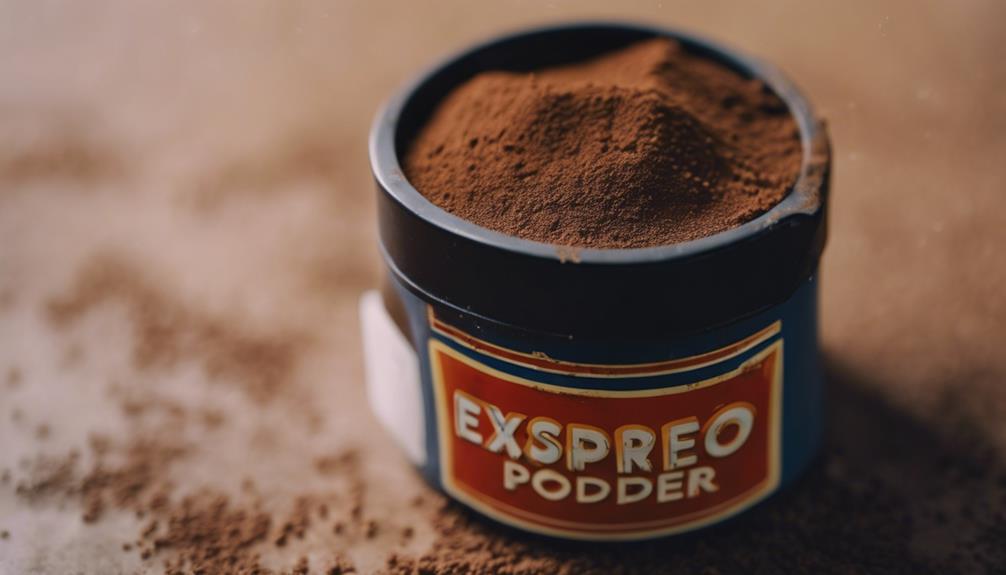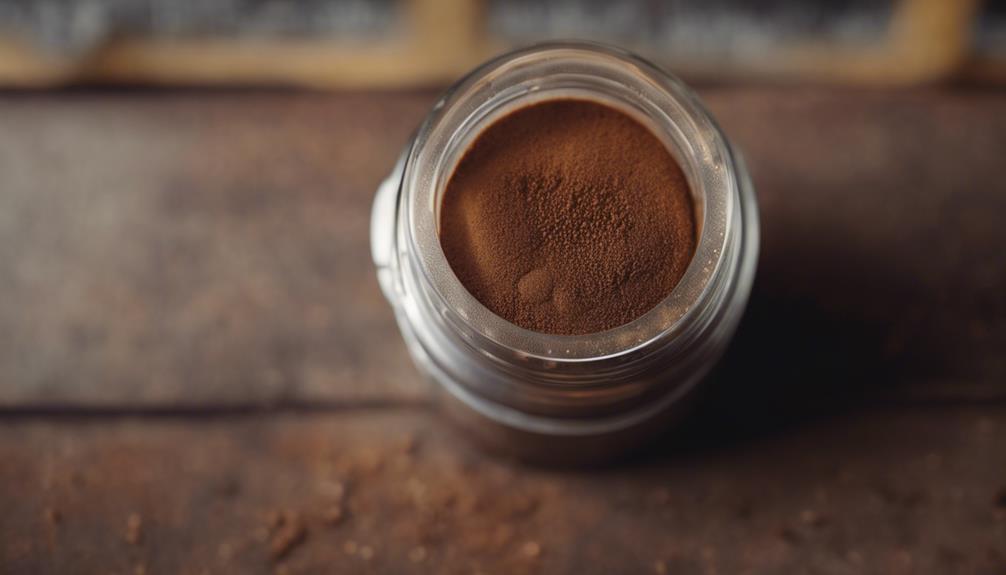Espresso powder does have an expiration date that can be affected by factors such as air exposure, temperature changes, and storage conditions. It is recommended to store it in a cool, dark, airtight place away from heat sources to maintain its freshness. Keep an eye out for any changes in color, aroma, or taste, as these can indicate spoilage and expiration. It is essential to use fresh powder for a rich coffee flavor and to be aware of its potency for optimal brewing. To find out more about signs of deterioration, proper storage methods, and estimates of shelf life, further exploration is advised.
Key Takeaways
- Yes, Espresso Powder expires due to air exposure and storage conditions.
- Proper storage in airtight containers extends shelf life.
- Signs of expiration include changes in color, aroma, taste, and texture.
- Fresh Espresso Powder is vital for quality coffee brewing.
- Regularly check for spoilage indicators to ensure potency and flavor.
Understanding Espresso Powder
To understand espresso powder, you need to grasp its origins and the variations available for different culinary uses. Espresso powder is derived from darkly roasted coffee beans, finely ground to create a concentrated and intense flavor profile.
There are two main types: Pure Espresso Powder for cooking and baking, and Instant Espresso Powder for beverages and culinary uses. The flavor of espresso powder diminishes over time, so it's best to consume it within a year for peak taste in your culinary creations.
The shelf life and expiration date of espresso powder are influenced by its oil content, affecting texture and applications in enhancing flavors. This distinct composition and flavor make espresso powder versatile for a wide range of dishes and baked goods, providing a unique and intense coffee essence to your culinary creations.
Factors Affecting Shelf Life
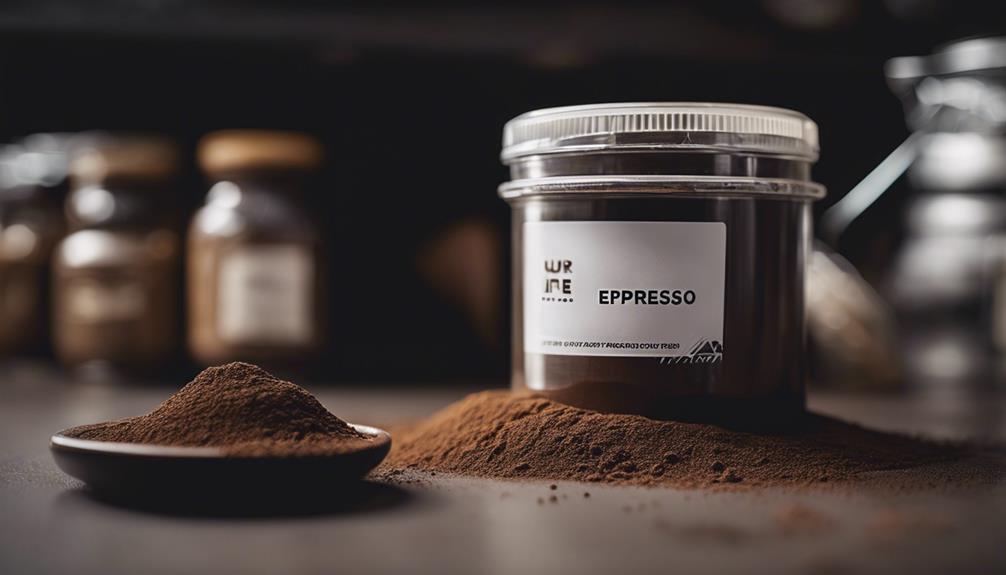
Understanding the shelf life of espresso powder involves considering several key factors that can impact its longevity and quality. Factors such as air exposure, temperature, humidity, and light exposure play an important role in determining how long your espresso powder will remain fresh. Storing your espresso powder in an airtight container in a cool, dark place away from heat sources is essential to extend its shelf life.
Additionally, be cautious not to place it near strong-smelling items, as espresso powder can absorb odors easily, affecting its flavor. Refrigeration can also aid in prolonging the shelf life of espresso powder. For even longer preservation, freezing espresso powder is a viable method.
Proper Storage Recommendations
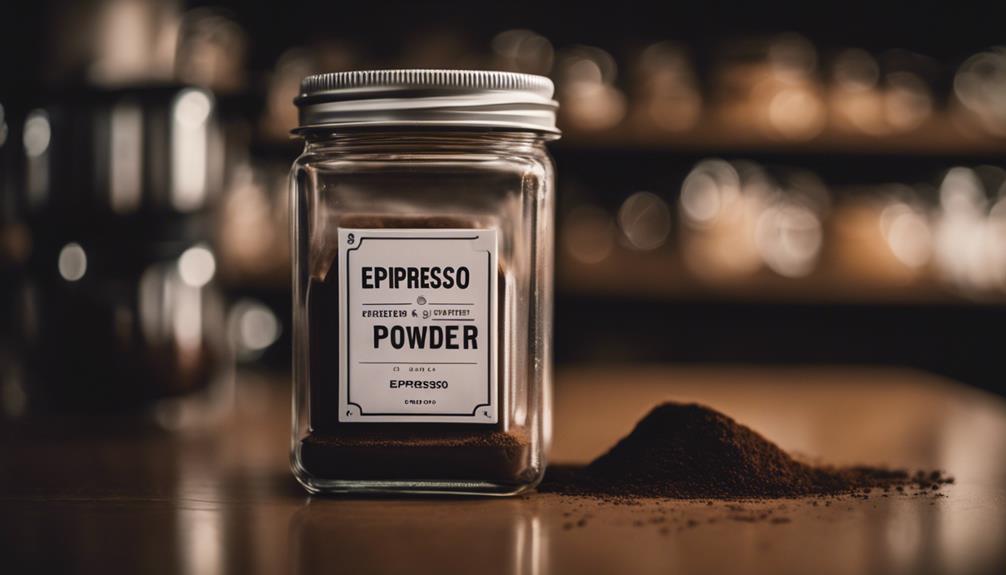
To keep your espresso powder fresh, store it in a cool, dark spot away from heat sources.
Seal it in an airtight container to shield it from air exposure, which can hasten expiration.
Remember to avoid strong-smelling items nearby to prevent odors from seeping in.
Storage Temperature Recommendations
Maintaining your espresso powder in a cool, dark place away from heat sources is crucial to preserve its freshness. Exposure to heat can degrade the quality of the powder, impacting its flavor and aroma over time.
By keeping it in a stable environment, you can prolong its shelf life and enjoy a rich, flavorful espresso experience. To guarantee maximum freshness, seal the espresso powder in an airtight container to shield it from air and moisture, which can cause it to deteriorate faster.
Remember to avoid storing it near strong-smelling items, as espresso powder readily absorbs odors. If you wish to extend its lifespan even further, consider refrigerating the powder to maintain its distinctive characteristics.
For extended storage, freezing espresso powder is an effective method to uphold its freshness and quality for a longer period. By following these storage temperature recommendations, you can savor delicious espresso with every brew.
Moisture Protection Strategies
For best preservation and flavor retention, safeguard your espresso powder from moisture by storing it in an airtight container. Moisture is the enemy when it comes to keeping your espresso powder fresh. Exposure to moisture can lead to clumping and a loss of flavor over time.
To prevent this, store your espresso powder in a cool, dry place away from humidity. Moisture can speed up the expiration process of espresso powder, impacting its quality and taste. Proper storage practices are essential in maintaining the integrity of your espresso powder.
Make sure to seal the container tightly to keep moisture out, and avoid storing it in damp environments. By taking these steps to protect your espresso powder from moisture, you can extend its shelf life and enjoy a delicious cup of espresso every time you brew it.
Shelf Life Considerations
Properly storing your espresso powder in an airtight container is crucial to extending its shelf life and maintaining its flavor potency. Espresso powder typically has a shelf life ranging from 6 months to 2 years, depending on storage conditions.
To guarantee your espresso powder stays fresh, store it in a cool, dark place away from direct sunlight and heat sources. Exposure to air, light, and moisture can expedite the expiration process and lead to a loss of flavor intensity.
Keep an eye out for any changes in color, aroma, or taste, as these can indicate that your espresso powder has expired. Mold growth, clumping, or unusual odors are clear signs that the espresso powder has gone bad and shouldn't be used.
Signs of Deterioration
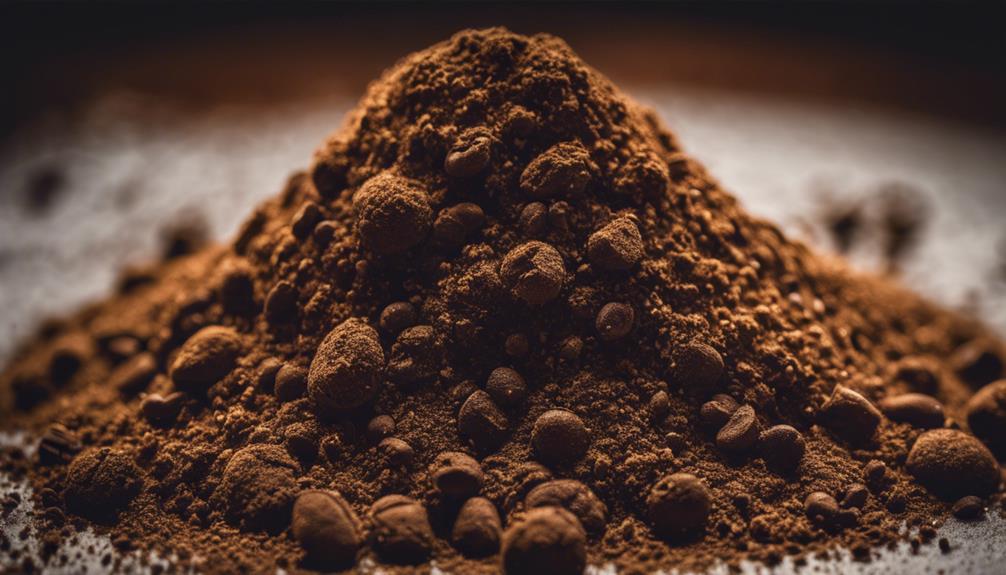
What're the key indicators that espresso powder may be deteriorating?
Signs of deterioration in espresso powder include changes in color, texture, or clumping. If you notice a stale or off aroma, it could mean the espresso powder has expired. Another clear sign of expiration is a loss of flavor intensity or bitterness. Mold growth or unusual odors are definite indicators of spoilage in espresso powder.
Always remember to check the expiration date on the packaging for guidance on the freshness of your espresso powder. By being attentive to these signs, you can guarantee that your espresso powder is in top condition for your beverages.
Keep an eye out for any unusual changes in color, texture, aroma, or flavor, as these can all point towards the deterioration of your espresso powder.
Estimated Shelf Life
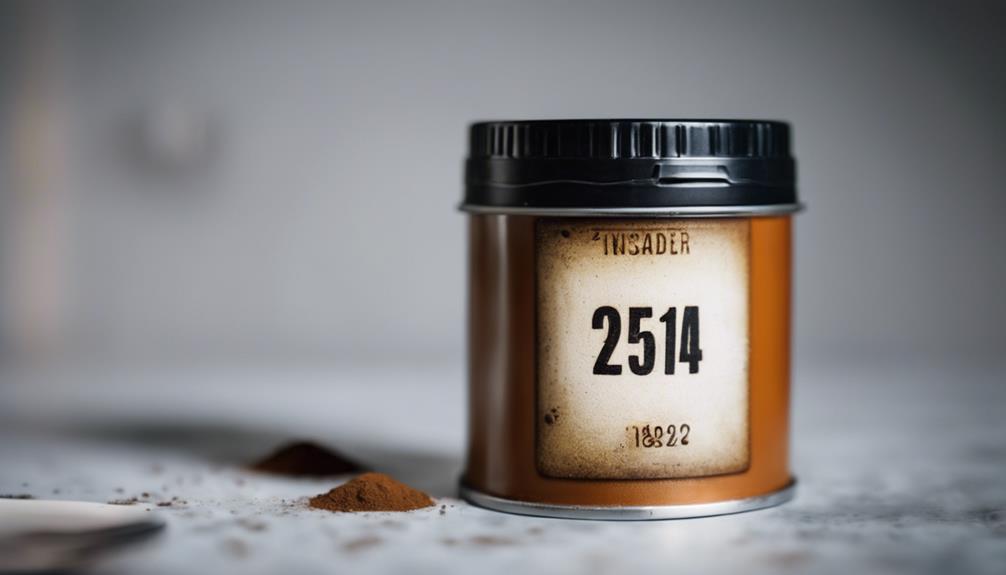
Espresso powder typically lasts from 6 months to 2 years, depending on storage conditions.
Storing it in an airtight container can help prolong its shelf life.
Be mindful of changes in color, aroma, or taste to determine if your espresso powder has expired.
Shelf Life Expectancy
The estimated shelf life of espresso powder typically ranges from 6 months to 2 years, depending on storage conditions.
To understand this better, consider the following:
- Storing espresso powder in an airtight container shields it from exposure to air, preserving its flavor and potency for a longer period.
- Keeping espresso powder away from direct light helps maintain its quality, as light can accelerate the expiration process.
- Moisture is another factor to watch out for; storing espresso powder in a dry environment prevents clumping and extends its shelf life.
Storage Recommendations
Properly storing espresso powder in an airtight container can significantly prolong its shelf life, guaranteeing freshness and flavor for an extended period. Espresso powder typically maintains its quality for 6 months to 2 years when stored correctly.
To maintain its potency, keep the espresso powder away from air, light, and moisture, as these elements can expedite its expiration. By sealing it tightly in a container, you shield it from these deteriorating factors, helping it stay flavorful for longer.
When storing espresso powder, make sure the container is placed in a cool, dark, and dry location. Avoid exposing it to temperature fluctuations or direct sunlight, as these can compromise its quality.
Regularly check the powder for any changes in color, aroma, or taste, as these can indicate that it has expired. Once expired, espresso powder may lose its robust flavor, affecting the overall taste of your brewed beverages.
Signs of Spoilage
Look out for changes in color, texture, or clumping as indicators of spoilage in espresso powder, with a shelf life estimated between 6 months to 2 years.
Here are three signs to watch for when checking your espresso powder for spoilage:
- Color Changes: If you notice that the espresso powder has turned notably darker or lighter than its original shade, it may have expired.
- Texture Alterations: Feel the powder between your fingers. If it feels sticky, clumpy, or has developed an unusual texture, it might be spoiled.
- Unpleasant Odors: Take a whiff of the espresso powder. A stale or off aroma is a clear indication that the powder has gone bad.
Culinary Applications Beyond Coffee
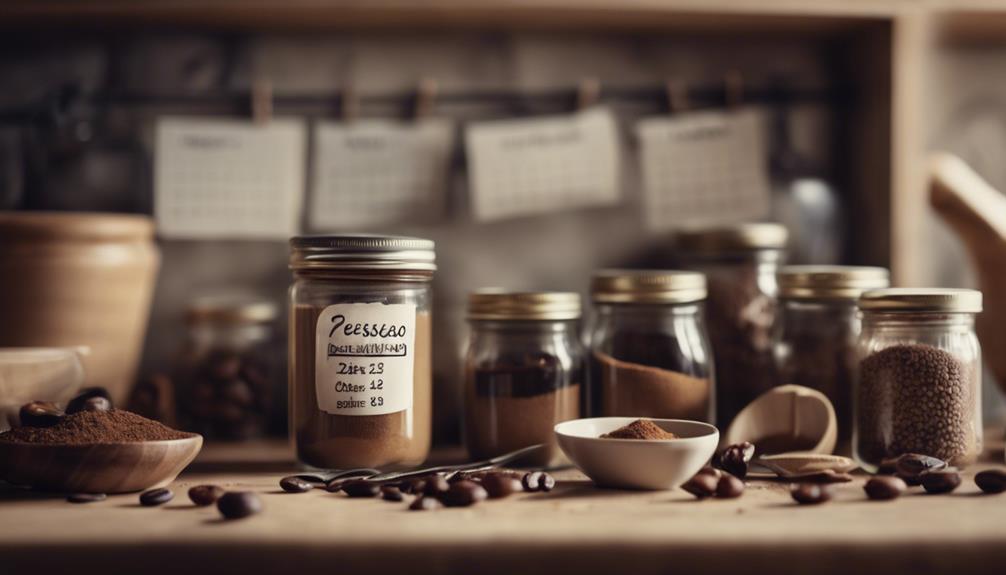
Have you ever considered the culinary possibilities beyond coffee when using espresso powder? Espresso powder isn't just for brewing a morning cup of Joe; it can elevate your cooking game to new heights. Whether you're whipping up a batch of brownies, enhancing the flavor of a steak marinade, or adding depth to your homemade barbecue sauce, espresso powder can be a secret weapon in your kitchen arsenal.
When using espresso powder in baked goods, its concentrated flavor can intensify the taste of chocolate desserts without imparting a strong coffee flavor. It can also enhance the richness of whipped cream, bread, and dairy dishes.
Just remember to use fresh espresso powder for best results. If stored properly in a cool, dark place, espresso powder can maintain its potency and flavor for an extended period.
Impact on Brewing Process
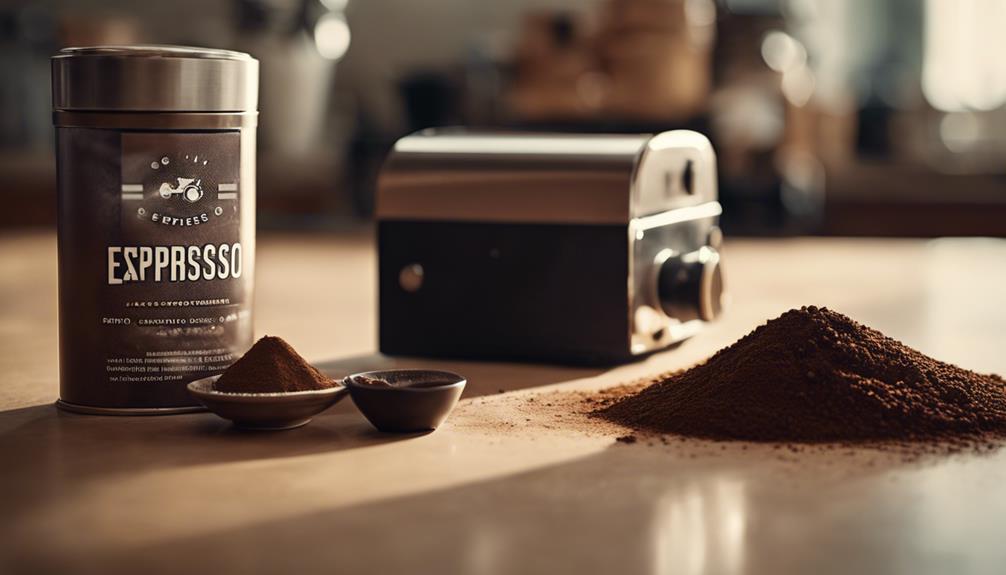
To maximize the flavor and quality of your brewed espresso, it's important to take into account the impact of using expired espresso powder. When your espresso powder has expired, the brewing process can be affected in several ways:
- Weaker Flavor: Expired espresso powder may lead to a weaker coffee flavor, diminishing the rich and robust taste you expect from a freshly brewed espresso.
- Texture Alteration: The expired powder mightn't dissolve properly, impacting the texture of your espresso and potentially affecting the overall quality of your drink.
- Potential Discomfort: Consuming expired espresso powder can result in stomach discomfort and compromise the flavor profile of your brewed espresso.
It's essential to make sure your espresso powder is fresh to avoid these undesirable outcomes during the brewing process. Remember to check for signs of expiration, such as changes in color, aroma, taste, and texture, to maintain the quality of your espresso.
FAQs About Espresso Powder
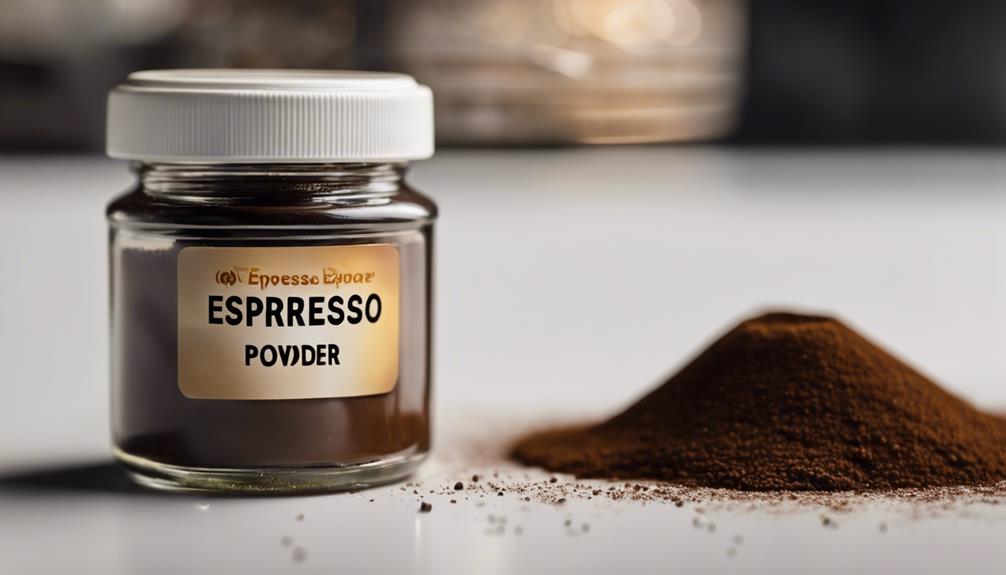
Exploring common inquiries about espresso powder can help clarify its usage and benefits in various culinary applications. When it comes to espresso powder, understanding its shelf life, storage conditions, and signs of expiration is essential for best use. Below is a table summarizing key FAQs about espresso powder:
| FAQ | Answer |
|---|---|
| What is the shelf life of espresso powder? | Espresso powder typically lasts 6 months to 2 years, depending on storage conditions. |
| How can you tell if espresso powder has expired? | Signs of expired espresso powder include changes in color, texture, aroma, taste, and the presence of mold. |
| What are the best storage conditions for espresso powder? | Properly store espresso powder in a cool, dark place in an airtight container away from heat and strong odors. |
Frequently Asked Questions
What Is the Shelf Life of Espresso Powder?
Espresso powder typically lasts 6 months to 2 years, depending on storage. Storing it in an airtight container helps extend its shelf life.
Exposure to air, light, and moisture can speed up expiration. Look out for changes in color, aroma, or taste as signs of expiration. Expired powder may lose its potency and flavor.
Proper storage is key to maintaining quality.
Can You Use Expired Espresso?
You shouldn't use expired espresso powder. Past its best, the powder loses potency, affecting flavor and aroma.
Stale powder mightn't dissolve properly, impacting drink texture. Consuming expired powder can lead to stomach discomfort.
Quality suffers when using expired powder, affecting your overall espresso experience. For peak results, use fresh espresso powder within its shelf life to enjoy a flavorful and satisfying beverage.
Can We Use Expired Coffee Powder?
When it comes to expired coffee powder, it's important to proceed with caution. While the flavor may deteriorate over time, you can repurpose it for various uses.
Think about using it as a deodorant, a cleaning agent, or even a natural mosquito repellent. Just make sure to do a patch test for skin care purposes and be mindful of any potential allergic reactions.
With a bit of creativity, expired coffee powder can still find its place in your daily routine.
Is Espresso Powder the Same as Espresso Instant Coffee?
Espresso powder and instant espresso coffee serve different culinary purposes. Espresso powder is concentrated for enhancing flavors in recipes, while instant espresso coffee is mainly used for beverages.
Espresso powder offers intense flavor and is incorporated into recipes for richness. Understanding this distinction is crucial for selecting the right product for your cooking needs. Make sure you choose the appropriate type based on whether you want to elevate flavors in dishes or enjoy a quick espresso drink.
Is it safe to consume expired espresso powder?
Yes, espresso powder can expire. It is generally safe to consume expired espresso powder, but it may not have the same flavor or potency. The expiration date indicates when the espresso starts to degrade in quality, so it’s best to use it before then. Check the packaging for the “do espresso shots expire” date.
What is the Shelf Life of Espresso Powder?
Espresso powder expiration date can vary depending on how it’s stored. Generally, it can last up to a year if kept in a cool, dark place. After that, it may start to lose its potency and flavor. Be sure to check the packaging for specific guidelines on shelf life.
Conclusion
To sum up, while espresso powder doesn't technically expire, its quality can deteriorate over time. Proper storage in an airtight container in a cool, dark place can help prolong its shelf life. Keep an eye out for any changes in aroma, flavor, or color to determine if it's still suitable for use.
Whether for baking, cooking, or brewing coffee, understanding the nuances of espresso powder can elevate your culinary creations to new heights.
